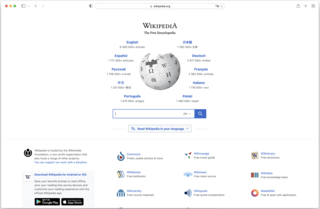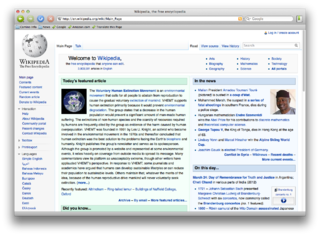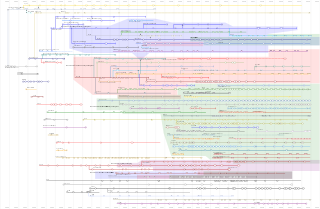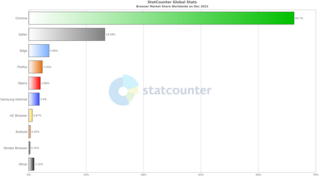This article needs additional citations for verification .(May 2023) |
This is a list of software that can block pop-up ads. Blocking is usually a user-enabled option, and can in many cases allow specified exceptions.
This article needs additional citations for verification .(May 2023) |
This is a list of software that can block pop-up ads. Blocking is usually a user-enabled option, and can in many cases allow specified exceptions.
Gecko-based browsers
Presto-based browsers
Others

JavaScript, often abbreviated as JS, is a programming language and core technology of the Web, alongside HTML and CSS. 99% of websites use JavaScript on the client side for webpage behavior.
Netscape Navigator is a discontinued proprietary web browser, and the original browser of the Netscape line, from versions 1 to 4.08, and 9.x. It was the flagship product of the Netscape Communications Corporation and was the dominant web browser in terms of usage share in the 1990s, but by around 2003 its user base had all but disappeared. This was partly because the Netscape Corporation did not sustain Netscape Navigator's technical innovation in the late 1990s.
Netscape Communications Corporation was an American independent computer services company with headquarters in Mountain View, California, and then Dulles, Virginia. Its Netscape web browser was once dominant but lost to Internet Explorer and other competitors in the first browser war, with its market share falling from more than 90 percent in the mid-1990s to less than one percent in 2006. An early Netscape employee, Brendan Eich, created the JavaScript programming language, the most widely used language for client-side scripting of web pages. A founding engineer of Netscape, Lou Montulli, created HTTP cookies. The company also developed SSL which was used for securing online communications before its successor TLS took over.

A web browser is an application for accessing websites. When a user requests a web page from a particular website, the browser retrieves its files from a web server and then displays the page on the user's screen. Browsers are used on a range of devices, including desktops, laptops, tablets, and smartphones. By 2020, an estimated 4.9 billion people had used a browser. The most-used browser is Google Chrome, with a 67% global market share on all devices, followed by Safari with 18%.

Camino is a discontinued free, open source, GUI-based Web browser based on Mozilla's Gecko layout engine and specifically designed for the OS X operating system. In place of an XUL-based user interface used by most Mozilla-based applications, Camino used Mac-native Cocoa APIs. On May 30, 2013, the Camino Project announced that the browser is no longer being developed.

A browser war is a competition for dominance in the usage share of web browsers. The "first browser war" (1995–2001) consisted of Internet Explorer and Netscape Navigator, and the "second browser war" (2004-2017) between Internet Explorer, Firefox, and Google Chrome.
In computing, the User-Agent header is an HTTP header intended to identify the user agent responsible for making a given HTTP request. Whereas the character sequence User-Agent comprises the name of the header itself, the header value that a given user agent uses to identify itself is colloquially known as its user agent string. The user agent for the operator of a computer used to access the Web has encoded within the rules that govern its behavior the knowledge of how to negotiate its half of a request-response transaction; the user agent thus plays the role of the client in a client–server system. Often considered useful in networks is the ability to identify and distinguish the software facilitating a network session. For this reason, the User-Agent HTTP header exists to identify the client software to the responding server.
Netscape 6 is a discontinued Internet suite developed by Netscape Communications Corporation, and was the sixth major release of the Netscape series of browsers. It superseded Netscape Communicator (4.x), as the release of Netscape Communicator 5 was scrapped. Netscape 6 was the first browser of the Netscape line to be based on another source code: Mozilla Application Suite, an open-source software package from the Mozilla Foundation, which was created by Netscape in 1998.
This is a comparison of both historical and current web browsers based on developer, engine, platform(s), releases, license, and cost.

Netscape Browser is the eighth major release of the Netscape series of web browsers, now all discontinued. It was published by AOL, but developed by Mercurial Communications, and originally released for Windows on May 19, 2005.
about is an internal URI scheme implemented in various web browsers to reveal internal state and built-in functions. It is an IANA officially registered scheme, and is standardized.

Netscape 7 is a discontinued Internet suite developed by Netscape Communications Corporation, and was the seventh major release of the Netscape series of browsers. It is the successor of Netscape 6, and was developed in-house by AOL. It was released on August 29, 2002 and is based on Mozilla Application Suite 1.0.
Netscape Plugin Application Programming Interface (NPAPI) is a deprecated application programming interface (API) for web browser plugins, initially developed for Netscape Navigator 2.0 in 1995 and subsequently adopted by other browsers.
A JavaScript engine is a software component that executes JavaScript code. The first JavaScript engines were mere interpreters, but all relevant modern engines use just-in-time compilation for improved performance.

The usage share of web browsers is the portion, often expressed as a percentage, of visitors to a group of web sites that use a particular web browser.

The Mozilla Application Suite is a discontinued cross-platform integrated Internet suite. Its development was initiated by Netscape Communications Corporation, before their acquisition by AOL. It was based on the source code of Netscape Communicator. The development was spearheaded by the Mozilla Organization from 1998 to 2003, and by the Mozilla Foundation from 2003 to 2006.

The Netscape web browser is the general name for a series of web browsers formerly produced by Netscape Communications Corporation, which eventually became a subsidiary of AOL. The original browser was once the dominant browser in terms of usage share, but as a result of the first browser war, it lost virtually all of its share to Internet Explorer due to Microsoft's anti-competitive bundling of Internet Explorer with Windows.

Lunascape is a web browser developed by Lunascape Corporation in Tokyo, Japan. It is unusual in that it contains three rendering engines: Gecko, WebKit, and Trident. The user can switch between layout engines seamlessly.
An Internet Explorer shell is a class of computer program that uses the Internet Explorer browser engine, known as MSHTML and previously Trident. This engine is closed-source, but Microsoft has exposed an application programming interface (API) that permits the developers to instantiate either MSHTML or a full-fledged chromeless Internet Explorer within the graphical user interface of their software.